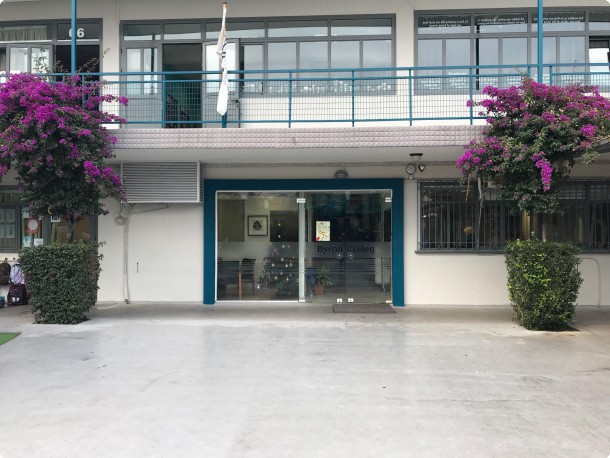In search of a Head. By Andrew Wigford

Searching for a new Head or Senior Leader requires a very different approach to recruiting teaching staff. Here’s an example of the process for a typical, well established, medium-sized, British international school that attracts both local and expatriate students. The school we are using for this example is Byron College in Athens, Greece, a British international school established in 1986 with more than 400 students of over 50 nationalities.
A true perspective
In the search for a new Head for Byron College, it was vital that we, as the agency supporting the whole selection and recruiting process, first knew the school thoroughly. As a result, I spent several fact-finding days at Bryon College, learning more from staff and parents, and seeing the school with my own eyes; looking for the reasons that would positively and negatively impact the recruitment of a good leader. I talked with various stakeholders to identify the challenges and opportunities that a new Head of school would face, and was also able to view all the lifestyle details that matter to candidates.
I was able to share all this detail with suitable applicants which avoided wasted time and misplaced hope for everyone involved. I was also able to discuss the potential challenges that the school posed for a new leader so that the board and selection team went into the search process aware of the reasons why some potential candidates would choose to decline the opportunity.
A Board needs to hear reality from a trusted external source as independent benchmarking rarely comes from within. The Board need to understand how their school fits into the global context as well as making comparisons locally. This is important; when it comes to international school recruitment, rarely does a senior candidate limit themselves to a city or country; most consider schools far and wide.
Working to a timeline
Establishing a realistic timeline was agreed as a priority early on in the process allowing me, as the consultant, to pressure and demand if deadlines came too close.
Helping everyone involved to understand the implications of this was crucial. Within a highly competitive recruitment market, finding the right person is a big enough challenge. Losing that right person because of broken promises and insufficient communication is something no school wants. Setting a recruitment communication strategy in place from the start, with appropriate responsibility, helps to alleviate such an eventuality.
Reality for all parties
At TIC, the leadership recruitment team then selected a shortlist of 15 potential candidates with the experience we needed to meet the school’s current and future leadership needs that we had identified.
These contenders were all interviewed by TIC managers via skype, during which we ascertained each individuals own priorities and needs, as well as the skills and experience they could bring to the school. Honest communication with these candidates was vital and ensuring they were clear on the school’s non-negotiables saved significant challenges further down the selection process.
These interviews between potential candidates and the recruiter were also essential for developing a level of trust. In our impartial, third-party role, we could provide candidates with an honest view of what the role and life in the school would be like. In return, we were able to gather crucial feedback from each candidate that helped us better understand their own priorities and needs, and whether they were a good fit for the school.
Preparing for a final choice
At this stage, having identified three best-fit candidates for final interview, it was important to highlight the potential challenges and opportunities that the school offered for them, knowing each individual’s needs as well as the needs of the school.
We addressed these needs with the Board and clarified their own expectations, in so doing, creating a realistic picture of a best choice and helping everyone to understand that there is no one perfect match. Too often, schools approach the final candidate interviews from the mindset of ‘us choosing you’. More often, particularly now that the market is so competitive, the end choice comes from the candidates. This preparation meant that the Board and all school stakeholders who were involved in the final selection went into the process with the most realistic expectations.
Final decisions
The leadership recruitment team at TIC helped the school plan a range of interview panels. Different panels were made up of a group of carefully selected parents, students, staff, senior management, and the Board. Each panel had different priorities and were offered a selection of possible questions and scenarios to present to the candidates.
Many people have never had the chance to participate in an interview panel and need coaching and mentoring to know what is required of them, to appreciate the types of questions to ask, and to learn how to evaluate candidates equally. It’s also essential to set expectations for all panelists. While their input will be considered and valued, the final choice will be down to the Board, which may not correspond with the preference of a panel. Establishing an understanding early on about ultimate decision can avert internal conflict later on.
Many factors influence a candidate’s final decision about a job, but experiences during their time at, or with, the school play a major part. This meant preparing not only the Board, but all the panelists and the administration and welcoming teams involved in the candidate visits. Details ranging from airport pickup, to overnight accommodation, school tour, welcome of other family members, viewing of accommodation, dinner or a social activity with a selection of school representatives, a tour of the city, and after-visit communication all impact a candidate’s final decision.
Recruitment success
For Byron College, the recruitment process was a success with an excellent new Head appointed.
 Mathematics Teacher
Mathematics Teacher Computer Science Teacher
Computer Science Teacher Mathematics Teacher
Mathematics Teacher Business & Economics Teacher
Business & Economics Teacher Science (Chemistry) Teacher
Science (Chemistry) Teacher
